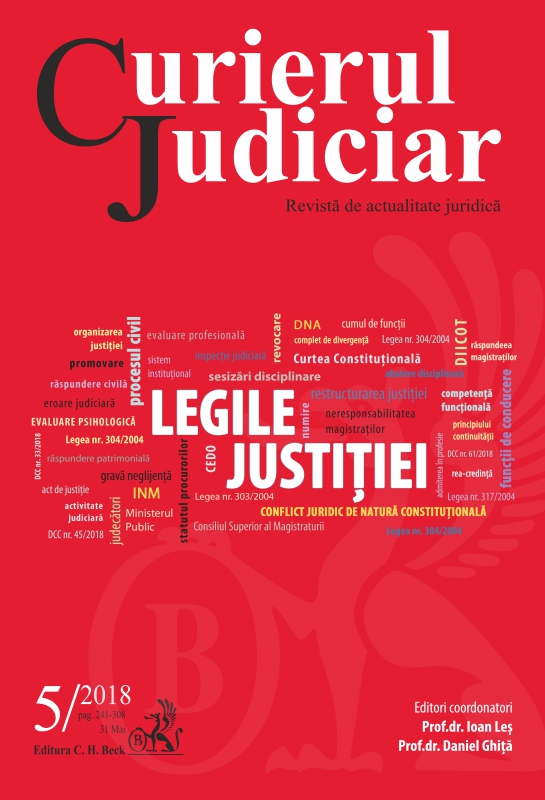Specificul legiferării domeniului psihologic pentru profesiile de judecător şi procuror
The specifics of the law-making in the psychological field for the judges and prosecutors
Author(s): Ion PopaSubject(s): Law, Constitution, Jurisprudence
Published by: C.H. Beck Publishing House - Romania
Keywords: clinical psychology; professional psychology; radical activists; suspension from office for medical cause; medical unapt magistrates; magistrate's reserve;
Summary/Abstract: Starting from the amendments to the statute of magistrates' in 2018, which the author regards as not only beneficial but also imperative, this article deepens two basic aspects in the recruitment, training and evolution of a judge / prosecutor, which, unfortunately, were marginalized or even excluded from the concerns of those who manage the judiciary in Romania and even by magistrates. This issue is the psychology of the magistrate, viewed from the perspective of its two components, clinical or medical psychology and professional psychology. From the perspective of clinical psychology, insufficient regulation was observed in the normative act in force, damaging both the magistrate and the system and the citizen. According to this regulation, psychologically unapt magistrates can not be suspended from office but it is necesary that the magistrates with medical disorders who no longer understand the nature of the acts committed in the exercise of their duties, are not incorrectly removed from the profession for disciplinary reasons, but for medical ones. These shortcomings have been removed by the new changes adopted in 2018. From the perspective of professional psychology, which is to create the magistrate's awareness of his status, of the attitudes and behavioral obligations in society and their limits, it was found that there is no minimum concern of the legislator in the current regulation, but unfortunately this situation continues in the new regulation. In order to avoid the risk of creating generations of radical activists instead of magistrates, the article's conclusion refers to the need to fill in the reported deficiencies, not sectorial, but in the framework of a extensive process of transforming the institutions called by law to manage these areas, the Superior Council of Magistrates and the National Institute of Magistracy.
Journal: Curierul judiciar
- Issue Year: 2018
- Issue No: 05
- Page Range: 290-295
- Page Count: 6
- Language: Romanian
- Content File-PDF

